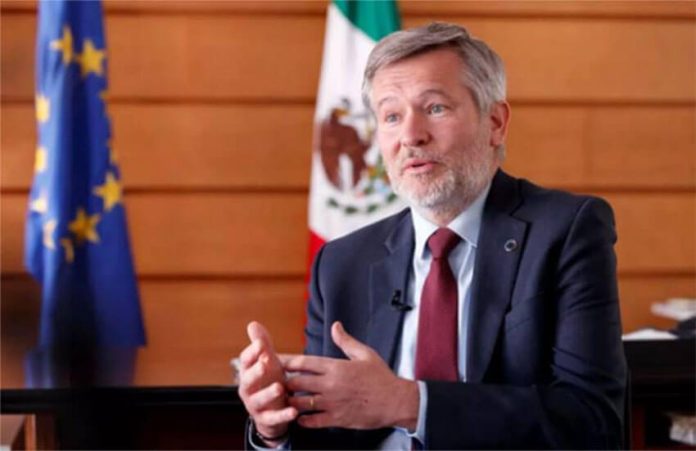The federal government’s proposed electricity reform is creating uncertainty and halting new investment, the European Union’s ambassador to Mexico said Thursday.
Gautier Mignot said the constitutional bill, which seeks to limit private and foreign companies’ participation in the electricity market by guaranteeing a 54% share to the state-owned Federal Electricity Commission, is generating uncertainty for European multinationals.
Such companies have invested some US $13 billion in Mexico, he said after a meeting with President López Obrador and other European officials in Mexico City.
“New investments are currently stalled because there is a context of uncertainty that makes it very difficult to invest,” Mignot told reporters.
“All [European companies] won’t withdraw from Mexico but some will, or they’ll reduce their activities,” he said.
A vote on the reform, which also seeks to get rid of the independent National Hydrocarbons Commission and the Energy Regulatory Commission, is not expected until next April, as the ruling Morena party and its allies agreed early last month to postpone it.
There is no guarantee it will pass Congress as the Morena-led coalition doesn’t have the two-thirds majority required to approve constitutional reforms without the support of opposition parties. If it does pass, legal challenges are seen as inevitable.
The United States ambassador to Mexico and a business group that represents Canadian companies in Mexico have already expressed concern about the bill. The Mexico CEO of General Motors said last month that the company won’t invest in Mexico without laws that support renewable energy, but Mexico’s emissions are predicted to substantially increase if the reform passes Congress.
Mignot said that it wasn’t the place of the European Union to tell Mexico to scrap the reform or to propose a counter-reform but urged the federal government to take two things into consideration.
Firstly, it should recognize that energy companies have invested in Mexico in good faith when no legal impediments existed, he said, adding that such companies – many of which generate clean, renewable energy – have created jobs and paid taxes.
“And the second thing we’re saying is take the Paris Agreement objectives into account,” the EU ambassador said.
President López Obrador said Wednesday that the approval of the proposed reform will allow “the balance lost” due to “neoliberal energy policy” to be recovered.
Previous governments “sought to ruin the national electricity industry and leave the market in the hands of private, mainly foreign, companies,” he declared at a rally in Mexico City to celebrate the third anniversary of his government.
With reports from El País
